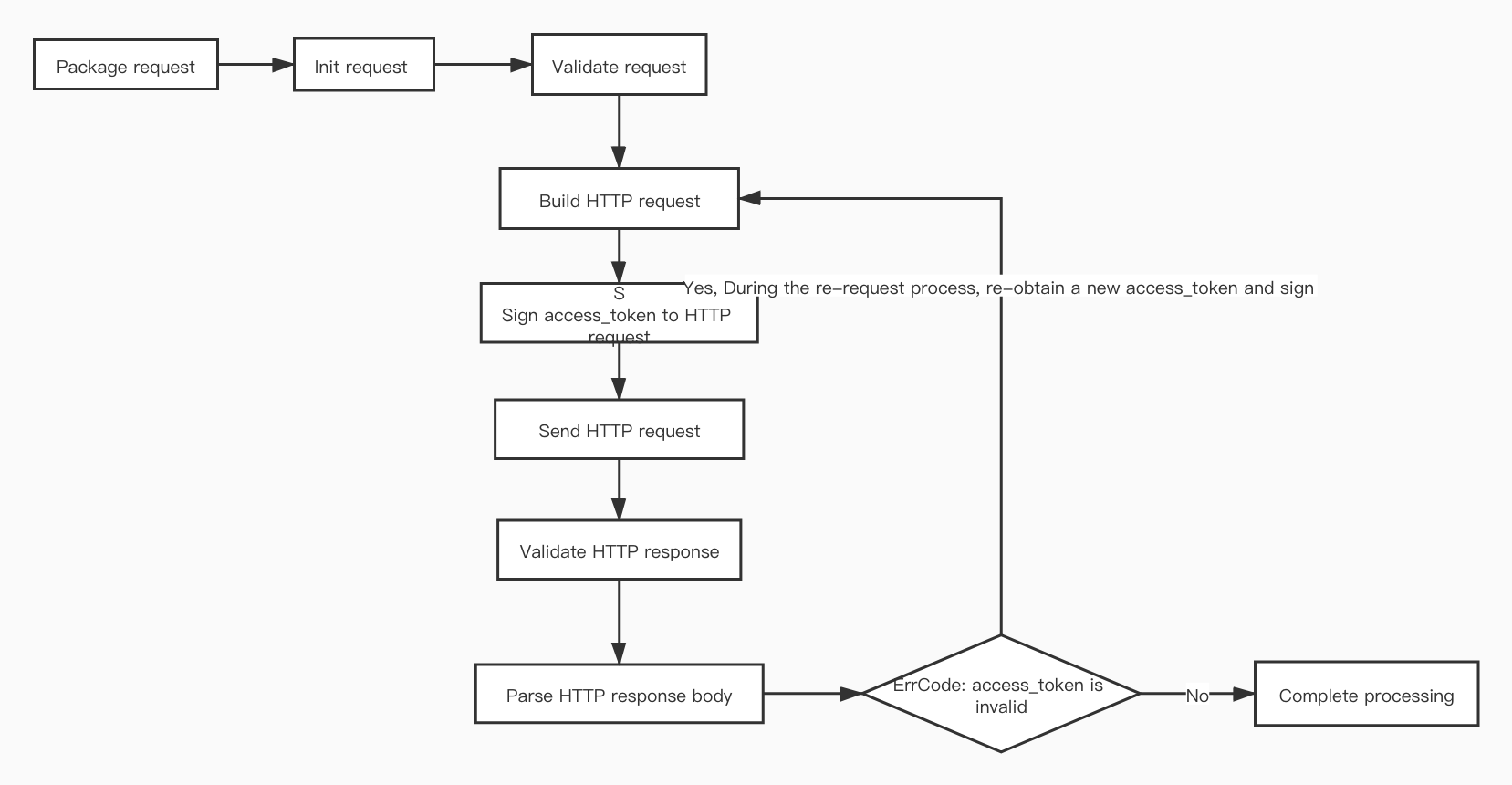1.0.14 • Published 4 years ago
@larksuiteoapi/allcore v1.0.14
larksuit open api sdk
| Module | description |
|---|---|
| core | Application information configuration and some general methods |
| api | Request the API of larksuite/feishu |
| event | Monitor the business data of larksuite/feishu changes and events generated |
| card | Monitor the actions of message card interaction |
| sample | Example |
installation
npm i @larksuiteoapi/allcorecore
Instructions for use
Get application configuration - Provides code samples to facilitate development - Use redis to implement Store interface for maintenance
app_access_token、tenant_access_tokenlife cycle - Instructions for the method are as follows:const lark = require("@larksuiteoapi/allcore") // Create application configuration to prevent leakage. It is recommended to put application information in environment variables. // appID: App ID in the application credential // appSecret: App Secret in the application credential // verificationToken: Verification Token in the event subscription // encryptKey: Encrypt Key in the event subscription, can be "", indicating that the event content is not Encryption // Settings of enterprise self-built apps let appSettings = lark.core.newInternalAppSettings("[appID]", "[appSecret]", "[verificationToken]", "[encryptKey]") // Settings of app store apps let appSettings = lark.core.newISVAppSettings("[appID]", "[appSecret]", "[verificationToken]", "[encryptKey]") // Create Config // domain: domain name http address: lark.core.Domain.FeiShu/lark.core.Domain.LarkSuite // appSettings: application configuration // logger: [log interface](packages/core/src/log/log.ts) // loggerLevel: output log level lark.core.LoggerLevel.DEBUG/INFO/WARN/ERROR (packages/core/src/log/log.ts) // store: [Store interface](packages/core/src/store/store .ts), used to store app_ticket/app_access_token/tenant_access_token // for online config let conf = lark.core.newConfig(domain,appSettings,logger,loggerLevel,store) // Config for development and testing // logger: use the default implementation (packages/core/src/log/log.ts) // loggerLevel: Debug level // store: use the default implementation (Map) let conf = lark.core.newTestConfig(domain, appSettings)
api
Processing flow
- For
app_access_token、tenant_access_tokenmaintain the life cycle of acquisition and made a package, developers can directly access the service API
- For
Instructions for use
- For
App Store application, when acquiringapp_access_token, you needapp_ticketto start the event subscription service The package request is as follows:
const lark = require("@larksuiteoapi/allcore") // Create request // httpPath: (path after `open-apis/`) API path, for example: https://{domain}/open-apis/authen/v1/user_info, the httpPath: "authen/v1/user_info" // httpMethod: GET/POST/PUT/BATCH/DELETE // accessTokenType: What kind of token access the API uses, value range: lark.api.AccessTokenType.App/Tenant/User, for example: lark.api.AccessTokenType.Tenant // input : The request body (may be formdata (for example: file upload)), if the request body is not needed (for example, some GET requests), pass: undefined // optFns: extension function, some infrequently used parameter packages, as follows: // lark.api.setPathParams({"user_id":4}): Set the URL Path parameter (with: prefix) value, when httpPath="users/:user_id", the requested URL="https://{domain}/open-apis/users/4" // lark.api.setQueryParams({"age":4,"types":[1,2]}): Set the URL qeury, it will be appended to the url?age=4&types=1&types=2 // lark.api.setTimeoutOfMs(1000), set the http request, timeout time in milliseconds // lark.api.setIsResponseStream(), set whether the response is a stream, such as downloading a file, at this time: the output value is of Buffer type // lark.api.setIsNotDataField (), set up in response to whether or not `data` field service interface are all` data` field, there is no need to set // lark.api.setTenantKey("TenantKey"), to `` ISV application status, indication `tenant_access_token` access API, you need to set // lark.api.setUserAccessToken("UserAccessToken"), represents the use of` user_access_token` access API, you need to set let req = lark.api.newRequest(httpPath: string, httpMethod: string, accessTokenType: AccessTokenType, input: any, ...optFns: OptFn[]))Send the request as follows:
- You can refer to the developer's documentation to know what fields the result (=http response body, non-download file interface) has
- lark.api.send, may throw error
const lark = require("@larksuiteoapi/allcore") let conf = xxx //lark.core.Config // Sending a message let req = lark.api.newRequest("message/v4/send", "POST", lark.api.AccessTokenType.Tenant, { open_id: "open_id", msg_type: "text", content: { text: "test" } }, // If app is ISV, lark.api.setTenantKey("TenantKey"), ) lark.api.sendRequest(conf, req).then(resp => { console.log(resp.getRequestID()) console.log(resp.getHTTPStatusCode()) console.log(resp) }).catch(e => { console.error(e) }) const fs = require("fs") // Upload an image // use stream // let data = fs.createReadStream('./test.png'); // use byte[] let data = fs.readFileSync('./test.png'); let formData = new lark.api.FormData() formData.addField("image_type", "message") // add file, if the interface supports multiple file upload, you can call formData.addFile many times formData.addFile("image", new lark.api.File().setContent(data).setType("image/jpeg")) let req = lark.api.newRequest("image/v4/put", "POST", lark.api.AccessTokenType.Tenant, formData) lark.api.sendRequest(conf, req).then(resp=>{ console.log(resp.getRequestID()) console.log(resp.getHTTPStatusCode()) console.log(resp) }).catch(e => { console.error(e) }) // Download the image let queryParams = { image_key: "img_xxxxxxxxxxxxxxxxxx" } let req = lark.api.newRequest("image/v4/get", "GET", lark.api.AccessTokenType.Tenant, undefined, lark.api.setQueryParams(queryParams), lark.api.setIsResponseStream()) lark.api.send(conf, req).then(resp=>{ console.log(resp.getRequestID()) console.log(resp.getHTTPStatusCode()) fs.writeFileSync("./test.0.png", resp.data) }).catch(e => { console.error(e) })- batch request call
- For
Tool
- Download file (for example: picture)
const fs = require("fs") const lark = require("@larksuiteoapi/allcore") // Parameter 1: File URL // Parameter 2: Request timeout (unit: milliseconds) lark.api.downloadFile("https://s0.pstatp.com/ee/lark-open/web/static/apply.226f11cb.png", 3000).then(buf => { fs.writeFileSync("./test.png", buf) })
event
Processing flow
- It encapsulates
App Store application(ISV)theapp_ticketevent (the event handler needs to be set again), to save it Store Decryption of event data and verification of source reliability
Instructions for use
- Event monitoring service started
- Set the event handler, for example:
const lark = require("@larksuiteoapi/coreall") const conf = xxx //lark.core.Config // Processing the "app_status_change" event // If you are processing other events, you only need to modify the "app_status_change". For the fields in the event, please refer to the open platform document lark.event.setTypeHandler(conf, "app_status_change", (ctx, event) => { let conf = lark.core.getConfigByCtx(ctx); console.log(conf); console.log("----------------"); console.log(ctx.getRequestID()); console.log(event); })
- It encapsulates
card
- Encapsulated
- Verification of the validity and source reliability of card data
Instructions for use
- Message card callback service started
- Set the card processor, for example:
const lark = require("@larksuiteoapi/allcore") const conf = xxx //lark.core.Config // handle the message callback cards, card in what fields, please refer to the open platform document lark.card.setHandler(conf, (ctx, card) => { let conf = lark.core.getConfigByCtx(ctx); console.log(conf); console.log("----------------"); console.log(ctx.getRequestID()); console.log(card.action); })